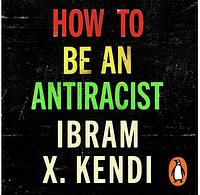You need to sign in or sign up before continuing.
Take a photo of a barcode or cover
This is a must read. Stamped from the Beginning was excellent and really parsed so much of the ideology that underpins race in our society. This is so much more immediate and actionable. I recommend both books. The connection to his own growth and his own personal health struggle... wow.
Thank you Dr. Kendi
Thank you Dr. Kendi
challenging
informative
reflective
informative
This book was incredibly informative and really eye-opening. Part memoir, part informative text, in each chapter, Kendi quite literally spells out all the ways in which one can actively be anti-racist.
I know so many people (myself included) who would insist that they aren’t racist based on their daily behavior, but Kendi breaks down all of the many, many different types of racism (biological racism, ethnic racism, behavior racism, color racism, gender racism, sexual racism, etc.). It helped me to understand the seemingly endless ways a person could behave in a way that is racist without necessarily knowing or even meaning to, because so much of it has been so deeply ingrained, both in our individual up-bringing and in our country's government policies.
What I loved most about the book was that in each chapter Kendi discusses events in his past in which he was either the victim of, or guilty of, the type of racism explored in that chapter. He is an amazing example of how to become informed, then objectively and honestly reflect back on your own behavior and beliefs, and then make the chances necessary to become an anti-racist.
I listened to the audio book, which was narrated by Kendi himself. I did read on a few reviews that the cadence of his reading became a distraction, and admittedly, that’s why I held off on reading it for as long as I did. I don’t think it impacted my listening experience as severely as that reviewer, but I will say it was definitely noticeable. At times he emphasized words and phrases in a beautiful poetic way, and at other times it put me in mind of William Shatner. However, it doesn’t detract from the overall message of each chapter, and that’s what’s most important.
The content is heavy, and there are a lot of historical references and statistics included. There were times I found it to be repetitive, and there were definitely some chapters I found way more engaging than others. I may have enjoyed reading a physical book more, but I think I may have also been tempted to take breaks from it. Ultimately I’m glad I decided to listen rather than read it.
This should be at the top of anyone’s to-read list who is interested in what it means to be an anti-racist and how they can start looking inward and making changes. I've added other books of his to my to-read (listen) list, and I'm eager to get started on them.
I know so many people (myself included) who would insist that they aren’t racist based on their daily behavior, but Kendi breaks down all of the many, many different types of racism (biological racism, ethnic racism, behavior racism, color racism, gender racism, sexual racism, etc.). It helped me to understand the seemingly endless ways a person could behave in a way that is racist without necessarily knowing or even meaning to, because so much of it has been so deeply ingrained, both in our individual up-bringing and in our country's government policies.
What I loved most about the book was that in each chapter Kendi discusses events in his past in which he was either the victim of, or guilty of, the type of racism explored in that chapter. He is an amazing example of how to become informed, then objectively and honestly reflect back on your own behavior and beliefs, and then make the chances necessary to become an anti-racist.
I listened to the audio book, which was narrated by Kendi himself. I did read on a few reviews that the cadence of his reading became a distraction, and admittedly, that’s why I held off on reading it for as long as I did. I don’t think it impacted my listening experience as severely as that reviewer, but I will say it was definitely noticeable. At times he emphasized words and phrases in a beautiful poetic way, and at other times it put me in mind of William Shatner. However, it doesn’t detract from the overall message of each chapter, and that’s what’s most important.
The content is heavy, and there are a lot of historical references and statistics included. There were times I found it to be repetitive, and there were definitely some chapters I found way more engaging than others. I may have enjoyed reading a physical book more, but I think I may have also been tempted to take breaks from it. Ultimately I’m glad I decided to listen rather than read it.
This should be at the top of anyone’s to-read list who is interested in what it means to be an anti-racist and how they can start looking inward and making changes. I've added other books of his to my to-read (listen) list, and I'm eager to get started on them.
informative
inspiring
reflective
medium-paced
Part memoir and part history of racism in the US (more educational for me than I care to admit), this book taught me that if I want to fight racism, I have to recognize that racial inequities exist not because of problems with groups of people, but because of problems with policies.
challenging
emotional
informative
inspiring
reflective
tense
medium-paced
informative
reflective
medium-paced
A good read, felt like a college lecture but in a good way. Gave me a new perspective on the idea that "POC can't be racist."
Wow, I am so glad I read this and led a book club discussion on it. Truly eye opening.


